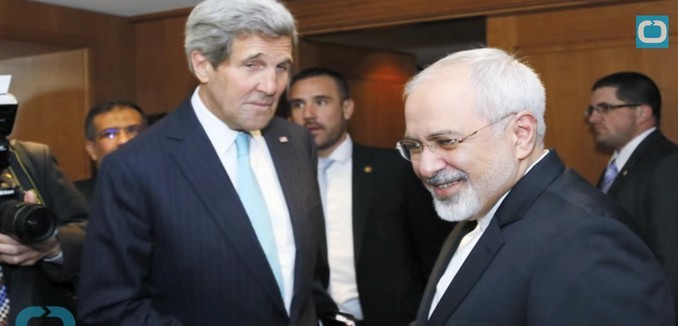The United States and Iran are moving closer to a deal that would allow Iran to keep as many as 6,500 centrifuges operating in return for Iran “guaranteeing regional stability,” according to a report today in The Jerusalem Post. The news, which cited European diplomats, was originally reported by Israel’s Army Radio.
According to EU officials, US Secretary of State John Kerry and his Iranian counterpart, Mohammad Javad Zarif, have discussed increasing the number of centrifuges which Iran would be permitted to keep. In exchange, the Iranians would undertake an obligation to bring their influence to bear in order to ensure quiet in Iraq, Afghanistan, and Syria.
European diplomats are quoted by Israeli officials as saying that the US in recent weeks has made significant concessions in its talks with Iran, so much so that it is willing to permit Tehran to operate 6,500 centrifuges while lifting sanctions that have hurt its economy this past decade.
The Europeans have told the Israelis that these concessions were offered in exchange for Iranian promises to maintain regional stability. According to Army Radio, the EU is opposed to the proposed linkage between the nuclear issue and other geopolitical matters. In fact, the Europeans suspect that Washington is operating behind Brussels’ back and that Kerry has not bothered to keep them in the loop in his talks with Zarif.
The Post notes that the administration denied a similar report over the weekend.
Research by the Institute for Science and International Security concluded that for a nuclear deal with Iran to be effective, Iran would have to dismantle over 15,000 centrifuges to bring their total to no more than 4,000. Iranian officials have repeatedly insisted that they will not reduce their enrichment capacity.
A recent report in The Daily Beast suggested that the United States has given priority to Iranian military concerns in Iraq, leading to a strengthening of the Islamic State of Iraq and Syria (ISIS) and increased sectarian strife in that country.
In 2013 paper (.pdf), Olivier Meier of the Institute for Peace Research and Security Policy at the University of Hamburg wrote that while Europe initially was pleased with the Obama administration’s participation in the nuclear talks with Iran, “some EU states feared that the USA might shift the goalposts for a diplomatic solution.”
In Replacement Theory: The Administration’s Crazy New Middle East Illusion, which was published in the December 2014 issue of The Tower Magazine, David Daoud warned:
Many interpret America’s softening stance toward Iran as an attempt to make Tehran more amenable to a deal on its nuclear program. But the Obama administration’s new approach to Iran doesn’t end with the nuclear issue, and assuming it does is to miss the true danger of it all. This White House views the nuclear deal currently being negotiated as only a first step toward a general détente and broader cooperation between the two countries. The perception permeating the Situation Room is that filling the power vacuum created by recent Middle Eastern upheavals with Iranian forces—especially its Revolutionary Guard Corps (IRGC) and its proxy Hezbollah—will help stabilize the ungovernable spaces of the region in Iraq, Syria and beyond. Getting the nuclear deal out of the way is therefore essential to progress on positioning Tehran as “a force for stability” in the region, as the President has described it.
For the Islamic revolutionaries and clerical dictators running the country, this new approach is a welcome change from decades of American efforts to sideline Iran. But Tehran is receptive to Washington’s changes for entirely different reasons. Seizing on what it sees as American weakness under this administration, Tehran believes it can break free of the diplomatic and economic sanctions that have crippled its economy, and freeze Western efforts to stall its regional ambitions. A nuclear deal in Iran’s favor may be with in its grasp, Tehran believes. And they may not even need to make such an agreement, if simply by negotiating with the West they can resurrect their economy and stall any U.S. action against their takeover of Syria, Iraq, and Yemen, removing further obstacles to their regional hegemony.
And it is here, in Iran’s very different view of a possible rapprochement with the United States, that the real danger to regional and American interests lies. Contrary to the expectations of many U.S. policymakers, giving Iran free rein in the Middle East would not be a major diplomatic victory, but a strategic nightmare. Replacing the putative caliphate of the Islamic State with the brutal Imamate of the Islamic Republic, the IRGC, Hezbollah and the rest of Iran’s regional proxies, would be a strategic and moral catastrophe.
[Source: WochitGeneralNews / YouTube ]




